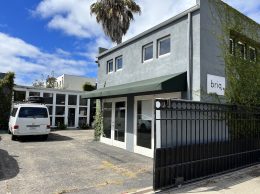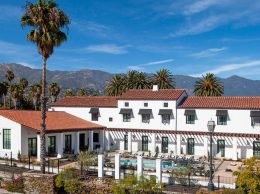Sansum Diabetes center announces name change, focus on local care
IN THIS ARTICLE
- Health Care & Life Science Topic
- Austen Hufford Author
By Austen Hufford Friday, June 27th, 2014
Sansum Diabetes Research Institute is changing its name as it focuses on expanding its local impact and advancing its pioneering research into treatments for Type 1 diabetes.
The Santa Barbara-based nonprofit research center is now named the William Sansum Diabetes Center, after its founder. The name change is designed to alleviate confusion between the diabetes research group and Sansum Clinic, which is one of the largest primary care organizations in the Tri-Counties. The two organizations are not affiliated.
The diabetes research group unveiled its new name at a June 26 event for supporters and donors. The organization recently brought on two new doctors and hired a new executive director 15 months ago.
The new name “will hopefully create a greater distinction for the institute in the local community and pays homage to our founder and to our legacy,” Rem Laan, executive director of the organization, said at the event at the Montecito Country Club.
The William Sansum center is at the forefront of diabetes research, particularly focused on the Type 1 form of the disease. Along with advancing research, the group performs clinical care and outreach in Southern California. Its protocols for the the management of Type 1 diabetes in pregnant women and its work on developing a so-called artificial pancreas device to manage glucose monitoring and insulin delivery have put it at the forefront of diabetes research around the world. Earlier this year, longtime diabetes researcher Dr. Lois Jovanovič, an innovator in the management of pregnancy in Type 1 patients, retired as chief scientific officer after 25 years with the organization.
As event attendees mingled and enjoyed refreshments, Dr. David Kerr, who recently joined the William Sansum center from a hospital in the United Kingdom, pointed at a fried-mushroom hors d’oeuvre. Currently, a person with diabetes would have to consider many factors before deciding whether to enjoy a bite, he said. But Kerr said he pictures a future in which an artificial pancreas could be connected to a patient’s smartphone, allowing for better decision-making with an app.
The center received a $2.3 million grant last year to further its research on an artificial pancreas, a device that would work by gathering data from a continuous sensor attached to a patient’s body. That information would be coupled with a complex set of algorithms to tell an insulin pump what to do.
Both the William Sansum Diabetes Center and Sansum Clinic, the primary care group, were founded by Dr. William Sansum in Santa Barbara. The doctor was a pioneer in diabetes research and, in 1922, was the first physician to inject U.S.-made insulin into an American patient.
Executive Director Laan said despite being known internationally in diabetes circles, the research center isn’t well known locally. “We very much want to increase our impact locally, he said. “We’re going to keep the best of the old and we’re going to do a lot of new.”












